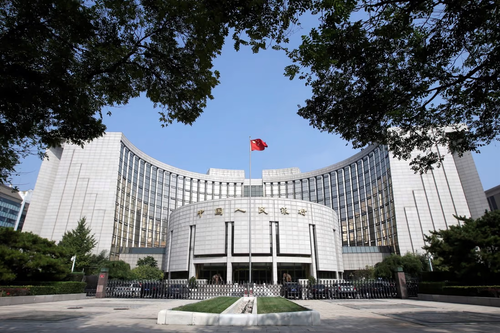China is taking serious steps to prepare itself for potential future US sanctions such as have been imposed against Russia's banking sector, with regulators recently convening an emergency meeting of domestic and foreign banks to examine how to best protect the country's overseas assets.
Over the weekend the FT identified that the internal conference was held on April 22 and included top officials from China's central bank and finance ministry. It's also said that representatives were sent from every domestic and Chinese overseas bank, and additionally some China-tied international institutions, notably among them HSBC. The somewhat secretive conference was held as Russia is charging Washington with stealing $300 billion of its assets held overseas.
"Western nations have actually stolen more than 300 billion US dollars from Russia when they seized the money meant to pay for Russian gas, Russian Foreign Minister Sergey Lavrov said in an interview with Al Arabiya TV on Friday," wrote state-run TASS base don the top diplomat's words.
Lavrov had with the last days again described US-led actions of the West "shameless robbery" and described, "London, Washington, Brussels are looking at seizing the money they have frozen to transfer it to someone else."
Indeed there's been open talk of using seized Russian assets, including frozen Russian Central Bank reserves, to rebuild Ukraine in the future and to fund Ukrainian institutions. European countries have led to way in the seizures with Washington's goading.
It appears China is taking note and not sitting idly by for its own similar crisis, especially as rhetoric ratchets concerning Taiwan and potential parallels with Ukraine. The emergency meeting also came after starting in March the Biden administration began expressly warning Beijing not to serve as enabler to Russia's military machine by supplying it, or also assisting in sanctions evasion. Biden had in a March 18 call conveyed this warning to President Xi Jinping directly.
1/6 Lavrov discusses rationale behind ruble payments by Europeans for Russian gas:
— M. K. Bhadrakumar (@BhadraPunchline) May 2, 2022
“A simple thing has happened that those who have been criticising and condemning our actions don’t want to talk about: our money, more than $300 billion, has been stolen.
Citing official sources out of China, FT details the following: "...the meeting began with remarks from a senior finance ministry official who said Xi’s administration had been put on alert by the ability of the US and its allies to freeze the Russian central bank’s dollar assets."
"The officials and attendees did not mention specific scenarios but one possible trigger for such sanctions is thought to be a Chinese invasion of Taiwan, which China claims as its territory and has threatened to invade if Taipei refuses to submit to its control indefinitely," the report continued.
A person briefed on some specifics discussed at the meeting told FT: "If China attacks Taiwan, decoupling of the Chinese and western economies will be far more severe than [decoupling with] Russia because China’s economic footprint touches every part of the world." And more from the report:
Senior regulators including Yi Huiman, chairman of the China Securities Regulatory Commission, and Xiao Gang, who headed the CSRC from 2013 to 2016, asked bankers in attendance what could be done to protect the nation’s overseas assets, especially its $3.2tn in foreign reserves. China’s vast dollar-denominated holdings range from more than $1tn US Treasury bonds to New York office buildings. State-owned Dajia Insurance Group, for example, owns the Waldorf Astoria New York.
At the same time, it seems Taiwan is on the opposite side of taking notes from the Ukraine playbooks and domino effect of international reaction.
“We try to see what we can learn from Ukraine in defending ourselves,” Taiwan’s Foreign Minister Joseph Wu told CNN's Fareed Zakarai in a Sunday interview.
As China engages in long-range preparations for a theoretical economic war with the West as a result of a Taiwan armed showdown, Taipei is thinking purely strategic defense and survival with help from the West. “There are two things, of course,” Wu said in the interview. "The first is asymmetric capability. Look at the Ukrainians, they use small personal weapons to go against a large enemy. And I think that is something we can learn from. In fact, we have been preparing for that, but we need to make more investment in this regard."
"The second area we can learn from Ukraine is civil defense. Look at the Ukrainian people," the foreign minister added. "All of the males are having the determination to defend the country. They want to serve in the military. They want to go to the war zones to fight against Russia. That kind of spirit is enviable for the Taiwanese people."
(Article by Tyler Durden republished from ZeroHedge.com)
